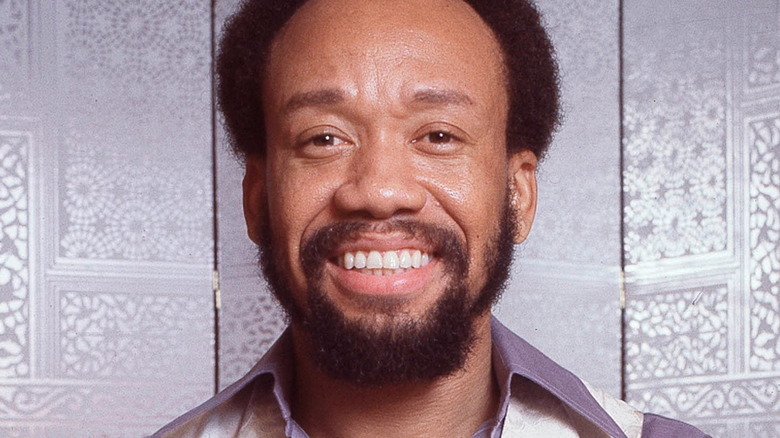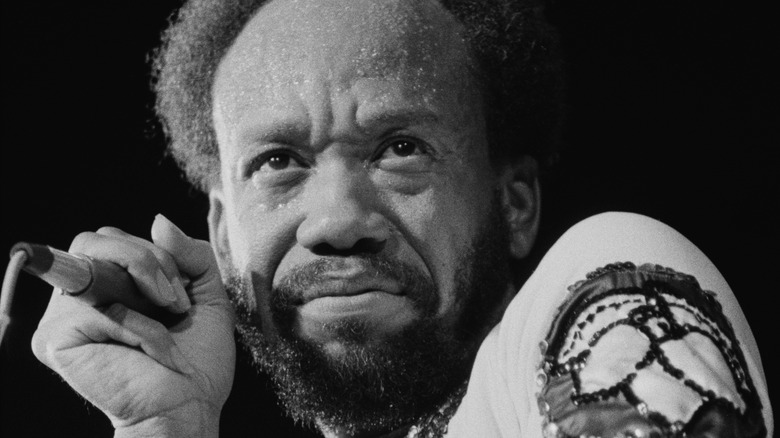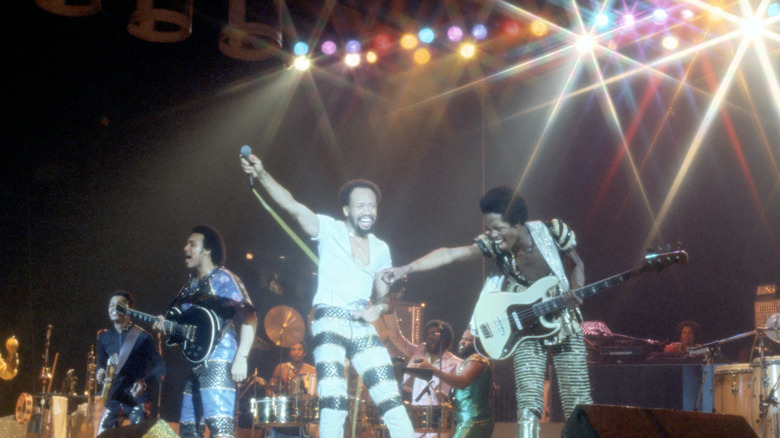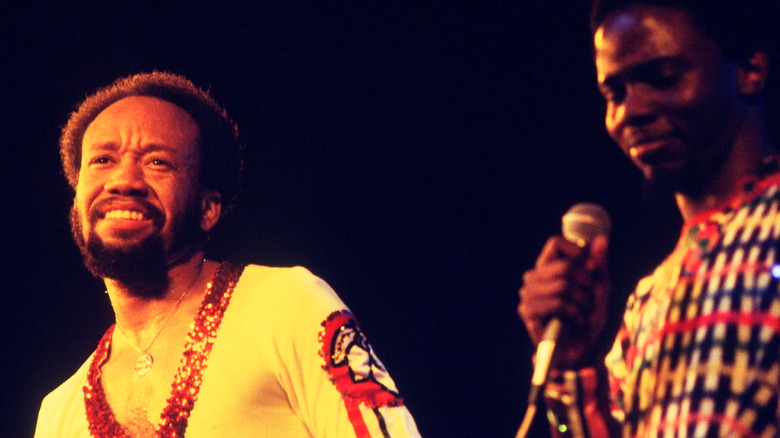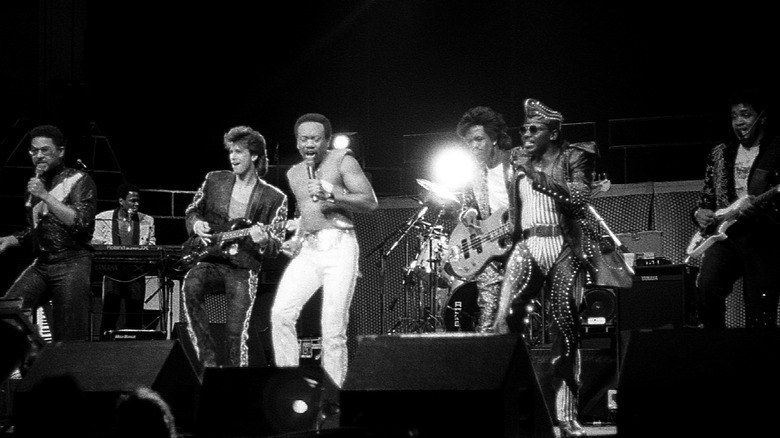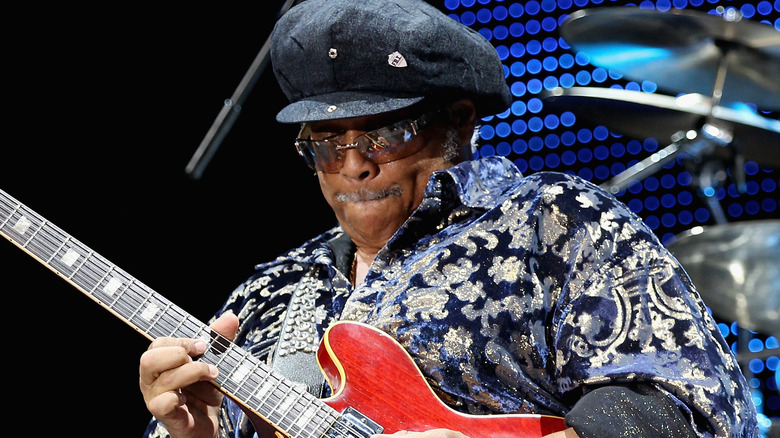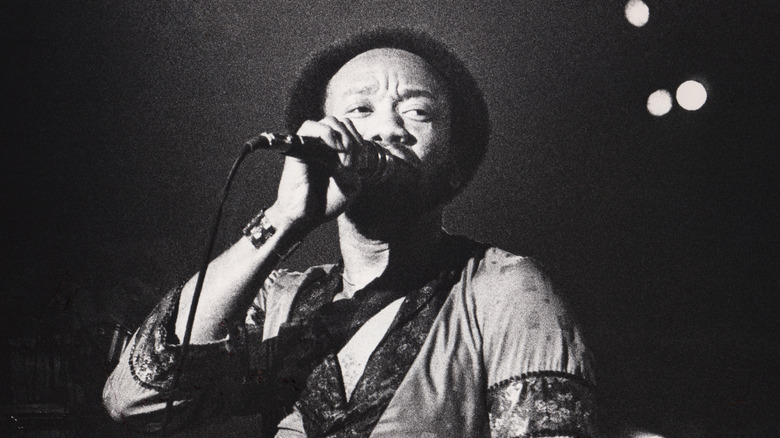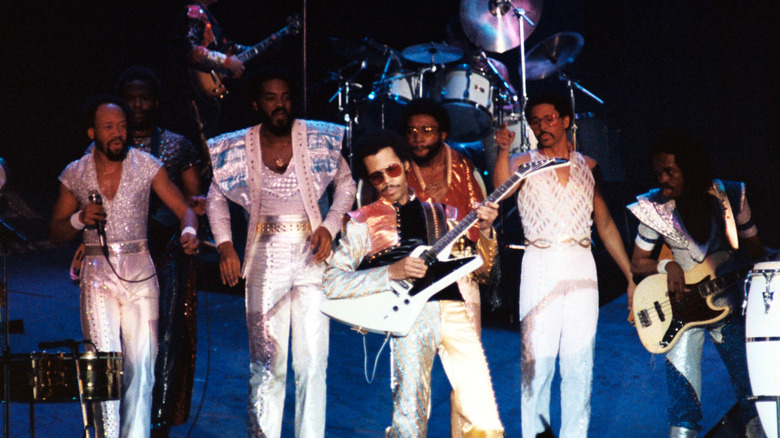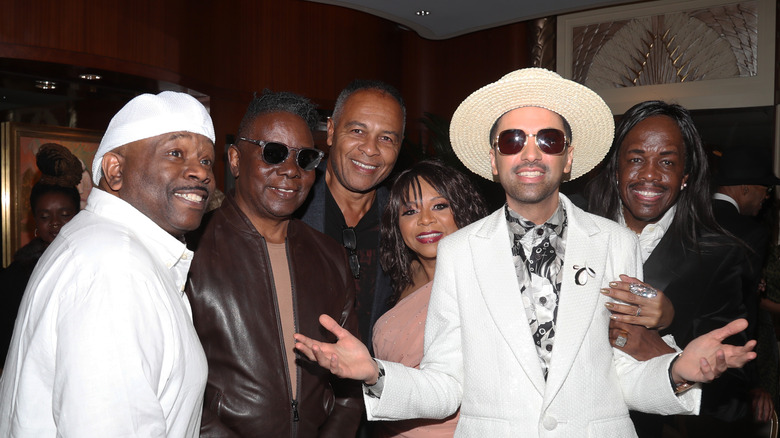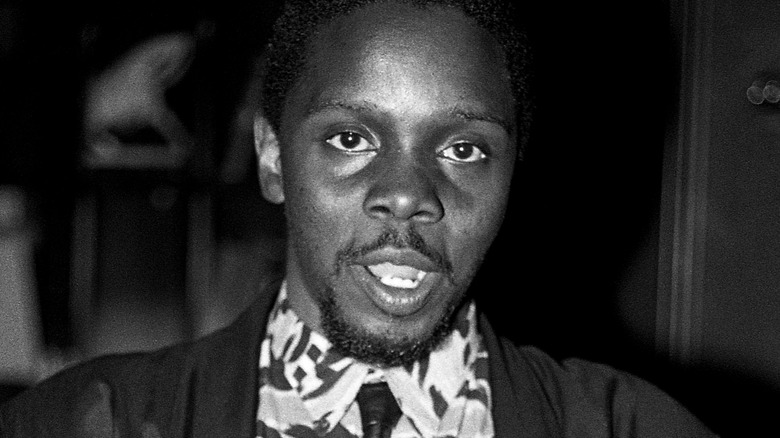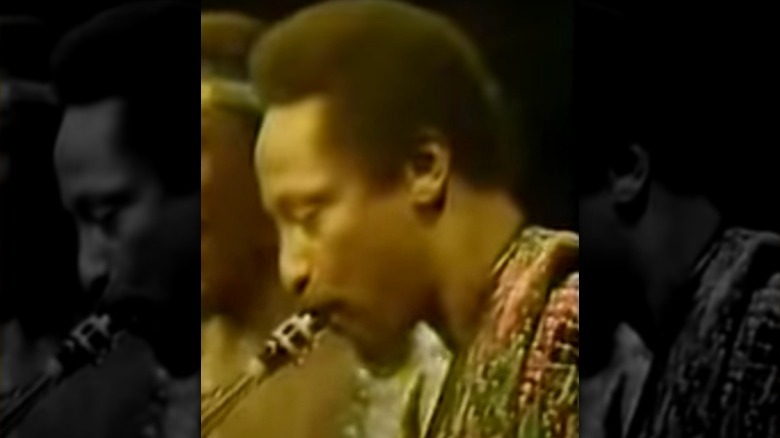Tragic Details About Earth, Wind & Fire
Especially after their induction into the Rock & Roll Hall of Fame in 2000, Earth, Wind & Fire solidified themselves as one of the greatest genre-crossing music groups of all time. And it would be impossible to honor the band without noting the tremendous efforts of its chief singer and songwriter, Maurice White, who not only created the group, but also led it to massive success in the 1970s, per Britannica.
Yet despite White's amazing accomplishments, his rather authoritarian style of leadership also brought on a good deal of heartache and turmoil for a considerable number of the band's many members. Eventually, the situation became so bad that the frontman even put an end to the band for some time in the mid-1980s.
Those volatile conditions, along with a few other shocking, tragic events, meant that every member endured much hardship on their rough road to fame. The worst of these moments are shared below and, given what the bandmates had to overcome, only makes their journey more impressive. Here are some of the tragic details about Earth, Wind & Fire.
Maurice White was assaulted right before his music career began
The initial steps Maurice White took on his journey to eventually become an incredibly successful musician occurred in Memphis during the late 1950s, where blues, jazz, and early rock and roll were thriving. However, aside from the music scene, the environment was far from ideal for White and most other Black people living in the city.
In his memoir, "My Life With Earth, Wind & Fire," White recalled one of the worst episodes of discrimination that he was forced to endure while delivering newspapers for work. Unfortunately, his route led him into what was considered a white neighborhood in that archaic time, as sunset was approaching. It was then that two police officers pulled their vehicle over to harass him. Calling the teen racial slurs was not even enough, for the two cops also proceeded to assault him as well.
White described the traumatic experience and the effect it had on him: "When they finally stopped, they calmly got in their cruiser and slowly drove off. I could hear their laughter fading as they got farther and farther away. Once I got up, I just stood there sweating and shaking in the cool evening air. I had urinated on myself. I vowed that if I got stopped again by the police, I would run and cut through somebody's backyard. The fear haunted me for several months."
If you or a loved one has experienced a hate crime, contact the VictimConnect Hotline by phone at 1-855-4-VICTIM or by chat for more information or assistance in locating services to help. If you or a loved one are in immediate danger, call 911.
The band struggled to succeed at first
After moving to Chicago, Maurice White continued to land music gigs and, most notably, became a member of The Ramsey Lewis Trio in 1967. But the venture was short-lived because the talented musician wanted a project of his own, as described in "My Life With Earth, Wind & Fire," so he formed The Salty Peppers in 1969 and moved to Los Angeles not long after,
Both in Chicago and at their new location, the group continued to struggle to gain a large following, which led White to rebrand them into their now iconic name, Earth, Wind & Fire. As EWF, the band did better, but still failed to produce anything hugely popular after their self-titled debut in 1970 and the next album, "The Need of Love," released the following year.
The frontman then decided it was necessary to start from scratch and completely replace every member of the group except for his brother, bassist Verdine White, according to AllMusic. At this point, singer Philip Bailey was one of the new major players brought on board, and by 1974 the revised lineup finally made EWF's first major hit, "Open Our Eyes."
Perry Jones was forced to leave the band
Earth, Wind & Fire worked hard to gain acclaim during their first few years in Los Angeles, but the band did manage to secure their place within the fold of a major studio, Warner Bros. And throughout this turbulent period, the group received help from Philip Bailey's mentor, Perry Jones, who was their main liaison with the label, as described in "My Life With Earth, Wind & Fire." Very quickly, he also became a close friend of Maurice White.
Yet, after EWF made the transition from Warner Bros. to Columbia in 1972, Jones' relationship with the band became strained. He also had left the studio with the hope of becoming the group's primary manager and was even living at White's home at the time. However, Jones was dismayed to learn that with Columbia came new management, so he effectively lost his place among them.
In his memoir, "Shining Star," Bailey recalled the painful, but necessary, decision to let him go: "Having Perry around caused tension within the ranks, until at the end of the year he left Southern California and returned to Denver. I felt bad seeing Perry go, since he had done so much as a friend, and hoped that one day our paths would cross again."
Jessica Cleaves was the last female singer
A revamped Earth, Wind & Fire added another dimension to the band with the singer Jessica Cleaves in addition to the other vocalists, Maurice White and Philip Bailey. This impressive trio was featured on the album "Last Days and Time," followed by "Head to the Sky" in 1973, according to AllMusic.
Yet, in one of the many changes to EWF's lineup over the years, Cleaves left not long after recording her second album with the band. In his memoir, "Shining Star," Bailey described the difficult situation leading up to her exit as she began calling off shows, and even worse, her bandmates became aware of her increasing drug use. The singer recalled: "Everybody loved Jessica like a sister. She was the sweetest thing with those beautiful eyes and her great voice, and I was sad that we weren't able to work it out. Jessica wound up being the last female core member of the group, as after her departure, Maurice decided to discontinue the female vocalist role and go on with just the guys."
On the other hand, White did not seem as upset with Cleaves leaving, and he explained in his book, "My Life With Earth, Wind & Fire," that the main reason was that she wanted to live with her new husband in Kansas. He rather coldly added: "Jessica had substance abuse issues, and she wasn't going to last long in the band anyway."
If you or anyone you know needs help with addiction issues, help is available. Visit the Substance Abuse and Mental Health Services Administration website or contact SAMHSA's National Helpline at 1-800-662-HELP (4357).
Charles Stepney suffered a heart attack
In 1976, the band members of Earth, Wind & Fire experienced a terrifying moment when arranger and producer Charles Stepney suffered a heart attack while they were recording their album, "Spirit."
Even though Stepney survived after he was taken to the hospital, it was just the beginning of the tragedy, as Philip Bailey recalled in his memoir, "Shining Star": "After cutting basic tracks at Hollywood Sound, we got the phone call: Charles was found dead in his home in Chicago by a family member. We were floored by the news. His death would affect us both personally and professionally, altering our course tremendously."
Maurice White also described how unexpected Stepney's passing was, because he seemed to be recovering as he rested back home in Chicago. In his book, "My Life With Earth, Wind & Fire," the frontman added, "No matter how death comes, sudden or not, it's always a shock, and Step's death was so abrupt."
The ugly departure of Al McKay
By far, the 1970s was the best decade for Earth, Wind & Fire in the long history of the band, per "AllMusic." But that would all change in 1980, when guitarist Al McKay became fed up with the drastically uneven way the cash was distributed between Maurice White and the rest of the group, says Philip Bailey in "Shining Star."
White, on the other hand, had a slightly different perspective on the fierce disagreements, and said in "My Life With Earth, Wind & Fire": "Al had had it with my leadership. We were clashing hard and had some serious heated disagreements. It got so bad that a few times we had to take it outside, so as to not completely ruin the vibe in the studio."
The situation reached its breaking point while EWF was touring throughout South America, and McKay announced that he wanted to quit the band. He was then officially fired shortly after, when he refused to fly to their next show in Mexico. Bailey recalled the difficult time: "It was a sad time for us to lose Al, our 'rhythm master,' but a relief to him, once it had gotten too intense and unbearably ugly for him to continue."
The rest of the band was not happy with Maurice White's control
Towards the mid-'80, the floodgates of discontent were opened wide within Earth, Wind & Fire, as the other band members began to show increasing disappointment that their ideas were not taken into consideration.
Maurice White, who refused to relinquish control of his band, explained the tense situation in his book, "My Life With Earth, Wind & Fire": "As time went on, I believe that my clarity about what I wanted to do and how I wanted to do it became a source of some of their frustrations."
White added that he did meet with each of his bandmates personally to calm things down, while maintaining a firm hand on the band's direction. However, it did not always work out, as White recalled: "Sometimes they would voice their complaints or frustrations to me; sometimes they would voice their frustrations with others within the band. Sometimes they would talk about personal frustrations, and sometimes we'd just go at it toe to toe."
Maurice White disbanded EWF without warning
After the massive failure of the album "Electric Universe," in 1983, Earth, Wind & Fire reached one of its lowest points when Maurice White put the band on an indefinite hiatus. The news was not only heartbreaking for his bandmates, but the worst part was that all of them were caught completely off guard by the decision and had no other means to make a living lined up in preparation for the breakup, according to Philip Bailey's "Shining Star."
Bailey described the disastrous aftermath: "For the rest of the band, the breakup was a nightmare. Some members lost their homes and fortunes, and some went into counseling after suffering nervous breakdowns. Even Maurice's brothers weren't immune from the axe. Maurice and Verdine weren't speaking to each other during this terrible time, and Freddie had moved on."
Percussionist Ralph Johnson was a member deeply affected by the shocking news and admitted how difficult it was for him when he told CBS News, "Yeah, 'cause this is all we knew, this is all we had. So, when somebody kind of pulls that rug out, you're like, now you've gotta rethink your whole program." Johnson was then forced to work in very different jobs for a time — first in construction, followed by a position at Federated Stereo as a salesman.
The failure of the American Recording Company
On top of the rough period that Earth, Wind & Fire was going through in the early '80s, Maurice White also had to deal with the collapse of his label, the American Recording Company (ARC). The label was established in 1978 when his band was at its height, a year after the release of hits like "Fantasy" and "Serpentine Fire," according to AllMusic.
Yet, in his book, "My Life With Earth, Wind & Fire," White acknowledged that the studio's dependence on his band led to its downfall when other negative factors came into play. As White recalled: "Earth, Wind & Fire, and to a lesser degree Deniece Williams, carried the American Recording Company. In many situations, that would have been enough. But between us starting the label at the beginning of the downturn in the record business and, to a lesser degree, my lack of interest, it may have been doomed from the start."
Philip Bailey was dropped from Columbia
Philip Bailey may have been one of the most important members of Earth, Wind & Fire, after Maurice White, per AllMusic, but even he was not immune to the rough times following the disbandment of the group in 1983.
The situation for the singer was great at first as he managed to start his own solo career and released three albums in just a couple of years. Yet when the last of this trio, "Inside Out," was released in 1986, and did not perform so well, his career hit a rough spot.
To his dismay, Bailey was called into the office of the new head of A&R on the West Coast for Columbia, where he got the terrible news that he was dropped from the record label. In his memoir, "Shining Star," Bailey recalled the painful experience: "I put on my best front and smiled and walked out the door, sunken and depressed. I had waited all this time, and now I was immersed in a cash-flow crunch as a result of the downtime and broken promises."
The murder of Don Myrick
Several years after Earth, Wind & Fire reunited, per AllMusic, the band faced another horrific tragedy when one of their former members, saxophonist Don Myrick, was shot and killed by a Santa Monica police officer.
In 1993, Myrick was mistaken for a drug dealer by law enforcement, when they carried out a search warrant at his apartment, as reported by the Los Angeles Times. In the chaos that ensued after they gained entry into the home, it was believed that the musician was carrying a firearm — but it was only a butane lighter.
Myrick's mother, Antoinette Myrick, took the city to court over the fatal accident and was awarded a settlement of $400,000. The district attorney was also highly critical of the officers' failure to adhere to knock-notice requirements, as they instead gained access using a key and without permission. The district attorney argued that if proper procedures had been followed, the musician might not have lost his life.
Maurice White suffered and died from Parkinson's disease
Earth, Wind & Fire getting back together in the latter half of the '80s was a happy occasion for the bandmates, but by the turn of the decade, it became increasingly clear that not all was well with the original founder of the talented group, Maurice White.
When talking with CBS News, Philip Bailey described what it was like for him to gradually discover that White was diagnosed with Parkinson's disease, saying, "It was a few years that, you know, we walked it down together. It took a lot of courage for him to finally get to the point of really even saying, 'This is what it is,' 'cause we were all hoping, you know, that it perhaps might be something else — something that you might be able to be treated with this, that, or the other."
By 1994, White's condition deteriorated to the point that he was unable to tour with the band, which was the first time that EWF performed without him at the helm. Then in 2016, the illness sadly took his life (per AllMusic), and the legendary songwriter passed away in his Los Angeles home.
